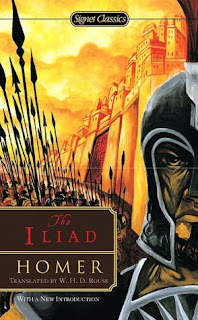 “An angry man – there is my story…” Homer sums up his entire tale with these few opening words. The first chapter opens with the King Agamemnon (the leader of the Danaän army) taking a woman from Achillês for his own use – a woman Achillês had “rightfully” won from the spoils of battle; the remainder of the story tells of Achillês’ subsequent anger and the consequences it has among Danaäns, Trojans, and the Olympians above until Achillês finally lets go of his anger in the last chapter.
“An angry man – there is my story…” Homer sums up his entire tale with these few opening words. The first chapter opens with the King Agamemnon (the leader of the Danaän army) taking a woman from Achillês for his own use – a woman Achillês had “rightfully” won from the spoils of battle; the remainder of the story tells of Achillês’ subsequent anger and the consequences it has among Danaäns, Trojans, and the Olympians above until Achillês finally lets go of his anger in the last chapter.
“The Iliad” is commonly thought of as a war book – and as a war book it has its fair share of violence and gore. The scattering of blood, brains, and entrails is frequently mentioned, and there are times when one would be hard put to find a paragraph that doesn’t contain a graphic portrayal of the war that serves as the story’s backdrop.
Though not nearly as prevalent as the violence, sexual content does appear frequently through the book. Paris and Helen – the two that started the Trojan War – lie together, Achillês sleeps with a woman he won in battle, and even Zeus and Hera sleep together. Aside from these direct instances (that, thankfully, were not dwelled on), there were also numerous innuendoes and one instance of a bared breast that made me extremely glad I was not watching the story in a movie.
On the nicer end of things, the strong sub-themes of friendship, loyalty, and kindness were a bright spot in the blackness the rest of the book’s content had to offer.
“The Iliad” was not written by a modern author or intended for a modern audience – and it shows. For one thing, scenery is remarkably sparse. Not once does Homer mention the landscape in passing. Landmarks are seen a few times, but even those are rare and are only referenced when they have a direct connection to the actions of one of the heroes. As far as Homer was concerned, the scenery didn’t matter.
As I read through “The Iliad”, I was pleasantly surprised by Homer’s treatment of characters. Homer may have suffered when describing settings, but he excelled in creating characters that are real to his reader. Homer gives each character a history and a personality that makes reading the exploits of his characters an enjoyable experience.
Another enjoyment came to me in the form of the culture Homer excellently wove into his story. Each glimpse he offers into the ancient culture of which he was a part – whether in recreation, battle, social living, or mythology – makes for fascinating reading.
The back cover of my copy of “The Iliad” contains this paragraph: “In his “plain English” translation, W.H.D. Rouse makes a point to keep the language as colloquial as Homer’s original was, never pedantic, high-flown, or clichéd. In fact, it is the nearest contemporary English equivalent to the epic Homer’s audience heard at their banquets.”
Furthermore, inside the book under “A Note on the Translation” one would find this: “…Rouse saw the Iliad … as [an] adventure [story], best translated into lively, natural prose that would appeal to “school-boys” and other nonspecialist readers.”
In theory, the above sounds great, but I found the reality of Rouse’s translation to be a bizarre hodgepodge of discord. I was able to tolerate the queer mix of epic and plain that grated on me throughout the story, but there were times in which odd dialogue became too much for me – it was easy to see that things had gone too far when the great Aias described an army as retreating “higgledy-piggledy”.
“The Iliad” offers an enjoyable glimpse into ancient cultures, peoples, and prose. If you are interested in reading it for those reasons, I promise you will not be disappointed (though I do recommend finding a copy that was not translated by Rouse). However, if all you are looking for is a book to read for enjoyment’s sake, I advise you to skip over “The Iliad” and keep looking – there are plenty of cleaner books to choose from at your local library.
This review was written by Mark Coddington as an in-depth guest review. Mark is a budding fantasy author and frequent contributor at the Holy Worlds forums.
0 comments:
Post a Comment
Please ensure that your comment is mature, thoughtful, and considerate of others' viewpoints. Inappropriate comments will be deleted without warning.